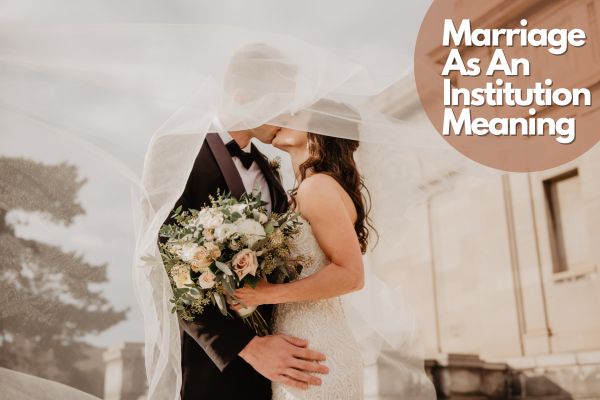Marriage as an institution has had profound implications in human societies throughout history. It serves as the basis for establishing social and legal perceptions of family units, procreation, and relationships.
This article looks at the meaning and purpose of marriage, its historical development, its social function, and its emotional aspects. It also examines its cultural and religious significance, legal considerations, and the challenges and controversies surrounding the institution in modern times. Explore the depth of marriage as a timeless institution and its evolving role in shaping relationships.
Marriage As An Institution Meaning
The importance of marriage as an institution includes several aspects that highlight the importance of marriage in human society. Marriage as an institution represents a formally recognized union between two people, usually based on love, commitment, and mutual consent. It goes beyond just a romantic relationship and has deeper social, legal, and emotional implications.
Marriage, in essence, serves as the foundation for building a family. It provides a framework for individuals to gather, live together, and create a stable child-rearing environment. Marriage enables the progeny and continuation of the human race and plays an important role in ensuring the survival and growth of society.
Moreover, marriage as an institution comes with many rights, obligations, and responsibilities. It creates a legal and social framework that regulates the rights and privileges of married persons. These include property rights, inheritance rights, tax benefits, and the ability to make important decisions on behalf of your spouse. It also imposes certain responsibilities, such as mutual support, fidelity, and shared responsibility for parenting.
Origins Of Marriage
The origins of marriage can be traced back to antiquity, but the lack of written records from this period makes it difficult to pinpoint its exact beginnings. However, anthropological and historical studies suggest that marriage became a social institution in response to various factors. Some theories and observations about the origin of marriage are:
1. Biological And Reproductive Factors
One theory holds that marriage arose out of the biological and reproductive needs of early humans. The desire to secure paternity, protect offspring, and build stable family units led to the development of pair bonds between the sexes. Marriage provided a socially accepted framework for regulating sexual relations, procreation, and transmission of property and inheritance.
2. Social Organizations And Alliances
Marriage played an important role in building social alliances and connections between different groups and tribes. By marrying outside the immediate family group, individuals are able to form alliances, strengthen social ties, and establish peaceful relationships with other communities. Marriage served as a tool to build and maintain social cohesion and facilitate the exchange of goods, resources, and information between groups.
3. Religious And Ritual Importance
The origin of marriage is closely related to religious and ceremonial practices. Many early societies believed that marriage had a spiritual or sacred meaning, and held rituals and ceremonies to celebrate marriage. These ceremonies were often accompanied by community participation and were seen as a way of seeking blessings, ensuring fertility, and ensuring the continuity of communities and tribes.
Importance Of Marriage As An Institution
The importance of marriage as an institution cannot be overemphasized, as it plays a vital role both in individual lives and in society as a whole. The main reasons why marriage is important are:
1. Formation Of Family Units
Marriage is the foundation of family formation. This creates a legally recognized and socially acceptable framework for individuals to come together, form committed partnerships and create a stable and nurturing environment for their children. A strong family contributes to individual well-being and social progress by providing emotional support, guidance, and a sense of belonging.
2. Birth And Parenting
Marriage serves as a natural and socially acceptable setting for childbirth and parenting. It provides a stable environment for children’s education and ensures their physical, emotional and intellectual development. Research consistently shows that children who grow up in stable marital relationships tend to achieve better education, health, and overall well-being.
3. Economic Stability And Division Of Labor
Marriage often implies the sharing of resources and division of responsibilities between spouses. This economic partnership will provide financial stability, enable shared spending, and enable long-term planning and investment for the future.
4. Emotional Support And Friendship
Marriage brings emotional support, companionship, and intimacy between spouses. It provides a safe space for individuals to share their joys, sorrows, and life experiences. Emotional bonding in a marital relationship contributes to overall well-being, emotional well-being, and a sense of belonging.
5. Social And Legal Recognition
Marriage is a socially recognized and legally binding institution. This system provides married couples with a range of rights, benefits and protections not available to unmarried persons. These include inheritance rights, access to health care and insurance, tax benefits, and decision-making rights in the event of illness or crisis.
6. Stability And Social Order
Marriage contributes to social stability and order. It fosters a sense of commitment, responsibility and accountability between spouses. Strong and healthy marriages are the foundation of a stable society and reduce social problems such as crime, substance abuse and domestic conflicts.
7. Cultural And Religious Importance
Marriage has cultural and religious significance in many societies. It is often accompanied by rituals, traditions and rituals that celebrate the union and strengthen the bond between two individuals. These cultural and religious dimensions promote a sense of identity, belonging and continuity of cultural practices.
Societal Functions Of Marriage
Marriage serves several important social functions that contribute to the well-being and stability of a community. While these functions vary by culture and historical period, common social functions of marriage include:
1. Formation Of Family Units
Marriage forms the framework of family formation. It establishes legal and social bonds between spouses and creates a recognized structure for raising children. The family unit formed by marriage is the basis for the continuity of society as it ensures the care, socialization and education of future generations.
2. Birth And Parenting
Marriage has traditionally served as the socially acceptable backdrop for procreation and parenting. We provide a stable environment to bring our children into the world and a framework for raising them with love, care and support. Marriage provides the necessary foundation for children’s physical, emotional and intellectual development and contributes to their overall well-being.
3. Economic Stability And Division Of Labor
Marriage often implies the sharing of resources and division of responsibilities between spouses. This economic partnership contributes to financial stability as couples can share spending, make joint financial decisions and plan for the future together. Marriage allows for the specialization of roles, with one spouse often focusing on income generation while the other is responsible for household chores and caregiving.
4. Social And Legal Perceptions Of Relationships
Marriage is the social and legal recognition of a firm partnership between two people. Gives her spouse many rights, benefits, and protections not available to unmarried persons. These include inheritance rights, access to health care and insurance, tax benefits, and decision-making powers in legal and medical matters. Marriage approval contributes to personal and family stability, security, and general well-being.
5. Socialization And Transmission Of Cultural Values
Marriage plays a role in the socialization of individuals and the transmission of cultural values from one generation to the next. In marriage, spouses learn and reinforce social norms, traditions, and customs. They pass on cultural practices, beliefs and values to children, thereby contributing to the preservation and continuation of cultural heritage.
6. Social Cohesion And Community Integration
Marriage promotes social cohesion and community integration by creating bonds between families and kinship networks. It creates connections and partnerships between individuals and groups, promoting social stability and cooperation. Marriage binds families together, celebrates milestones, supports each other, and creates a sense of belonging and connection within the larger community.
Emotional And Psychological Aspects Of Marriage
Marriage involves many emotional and psychological aspects that greatly affect each person’s happiness and fulfillment in the marital relationship. Important emotional and psychological aspects of marriage are:
1. Emotional Support And Intimacy
Marriage provides a platform for emotional support, intimacy, and companionship. Spouses in a healthy marriage are able to offer each other comfort, understanding, and empathy during the joys, heartaches, and difficulties of everyday life. The emotional bond that develops within a marital relationship creates a safe space for vulnerability, shares emotions, and builds a deep sense of connection.
2. Belonging And Identity
Marriage contributes to a person’s sense of belonging and identity. We provide lifelong partners with whom we can share our experiences, dreams, and values. Belonging to a couple’s union provides a sense of security and peace of mind that there is someone who will support and stand by your partner through the ups and downs of life. Marriage often plays a role in shaping an individual’s identity, as the individual assumes the roles and responsibilities that come with life as a spouse.
3. Mutual And Personal Growth
Marriage provides opportunities for mutual growth and personal growth. Spouses can inspire and motivate each other to reach their full potential and support each other’s goals and aspirations. Through the challenges and successes we encounter in our relationships, we learn more about ourselves, develop new skills, and grow as individuals.
4. Conflict Resolution And Communication Skills
Marriage provides an environment for the development and refinement of conflict resolution and communication skills. In a healthy marriage, couples learn to express their needs, opinions, and feelings effectively. Develop the ability to listen empathetically, find common ground, and negotiate compromises. Skills learned in relationships can be applied to other areas of life, promoting healthier relationships and interactions with others.
5. Emotional Stability And Mental Health
A satisfying and supportive marriage contributes to emotional stability and mental well-being. Having a caring and understanding partner is a buffer against stress, anxiety and loneliness. Sharing the joys and burdens of life with your spouse increases your overall emotional resilience and promotes feelings of well-being and contentment.
6. Sense Of Purpose And Meaning
Marriage often gives individuals meaning and purpose in life. The devotion and devotion required in a marital relationship bring a deeper sense of fulfillment and contribute to a sense of purpose beyond oneself. Working together to build a life together can bring a sense of purpose and fulfillment to both parties.
Cultural And Religious Significance Of Marriage
Marriage has cultural and religious significance in societies around the world. It is often accompanied by ceremonies, traditions, and rituals that reflect and reinforce cultural and religious beliefs. Here are some important aspects of the cultural and religious meaning of marriage.
1. Rituals And Ceremonies
Weddings are deeply rooted in cultural and religious traditions. They vary widely by culture and may include specific rituals, customs, and symbolic gestures. These ceremonies often involve family, friends, and the community, creating a sense of togetherness and celebration. Rituals and ceremonies associated with marriage serve to respect cultural heritage, preserve traditional customs, and demonstrate the sanctity of the marriage bond.
2. Symbolism And Sacredness
Marriage is often viewed as a sacred and symbolic bond between two people. It represents the union of two souls, the unity of a family, and the creation of a new social being. Symbolic elements such as rings, vows, and blessings are often incorporated into wedding ceremonies to symbolize devotion, fidelity, and the sacred nature of marriage. The symbolic aspect of marriage contributes to its deeper meaning, elevating it beyond a mere legal or social contract.
3. Family And Community Involvement
Marriage is not just an individual matter, it also requires the participation and support of family and the larger community. By involving family members in the matchmaking process, wedding preparations, and the celebration itself, family and social bonds are strengthened. Marriage provides an opportunity for families to unite, celebrate cultural and religious traditions, and reaffirm shared values and traditions.
4. Social Roles And Expectations
Cultural and religious beliefs often shape the roles and expectations associated with marriage. These beliefs prescribe specific gender roles, responsibilities, and obligations for spouses in marital relationships. For example, some cultures emphasize the importance of male breadwinners and women’s domestic responsibilities, while others emphasize equality and partnership. These cultural and religious expectations influence the dynamics, interactions, and division of roles within marriage.
5. Continuation Of Pedigree And Tradition
Marriage is often seen as a means of ensuring the continuation of bloodlines, surnames, and cultural traditions. By forming marital ties, individuals contribute to the growth and maintenance of the family tree. Marriage plays an important role in passing on cultural practices, values, and beliefs from one generation to the next, reinforcing cultural identity and maintaining continuity.
6. Legal And Social Awareness
Cultural and religious significance also intersect with legal and social perceptions of marriage. In many societies, religious or cultural marriages may have legal implications, and marriages are legally recognized and protected. This recognition gives married people certain rights, benefits and responsibilities, such as inheritance rights, tax benefits, and access to health care and insurance.
Legal And Practical Considerations
Legal and practical considerations play an important role in the institution of marriage. They cover various aspects related to legal recognition, rights, obligations and practical implications of marriage. Here are some important legal and practical considerations related to marriage.
1. Legal Awareness
Marriage is a legal institution in most countries and obtaining a marriage license or certificate is a prerequisite for legal marriage. Legal recognition of marriage gives spouses many rights and benefits, including inheritance rights, tax benefits, social security benefits, and the ability to make medical and legal decisions on behalf of their spouse. increase.
2. Rights And Responsibilities
Marriage gives spouses certain rights and obligations. This includes financial obligations, such as obligations to support each other and cooperate in managing assets and liabilities. Spouses may also have legal obligations to each other, such as providing spousal support in the event of divorce or separation.
3. Property And Property Rights
Marriage often affects the ownership and distribution of property and assets acquired during the marriage. In many jurisdictions, marital property is considered joint property of both spouses, regardless of who acquired it. This means that property and property can be divided or inherited according to legal guidelines in case of divorce or death.
4. Health And Medical Consideration
Marriage can have a practical impact on health care and medical decisions. In many jurisdictions, spouses have the right to make medical decisions on their partner’s behalf in cases of incapacity. You may also be able to take advantage of medical benefits, such as the ability to enroll your spouse in health insurance.
5. Parent Rights And Obligations
Marriage often provides a legal framework for parental rights and responsibilities. Both spouses are presumed to be the legal parents and children born to the marriage are usually considered the legal children of both parents. Marriage entails issues such as child custody, visitation rights, and obligations to provide financial support in the event of divorce or separation.
6. Immigration And Citizenship
Marriage can affect immigration and citizenship procedures. In some countries, marrying a citizen may provide certain immigration benefits, such as being able to apply for a spouse visa or residence permit for your foreign spouse. Marrying a citizen also facilitates the process of obtaining citizenship and permanent residency.
7. Dissolution And Divorce
Legal considerations also come into play in the case of a dissolution of a marriage or divorce. Legal procedures for terminating a marriage vary by jurisdiction but often involve property division, spousal support, child custody, and visitation rights. The legal framework provides policies and procedures for resolving these issues fairly and equitably.
Challenges And Changing Perspectives
Marriage, like any other social institution, faces a variety of challenges, and perspectives can change as societies develop. These challenges and shifting perspectives reflect shifting social values, cultural norms, and individual aspirations. Here are some of the major challenges and perspective shifts related to marriage.
1. Changing Gender Roles
A major challenge to traditional marriage norms is the shift in gender roles and expectations. As the importance of gender equality and women’s empowerment grows, there is an increasing emphasis on equal partnerships, shared responsibility, and rejection of rigid gender roles in marriage. This shift calls into question traditional notions of marriage, often based on different gender roles and expectations.
2. Changes In Marriage Views
Attitudes toward marriage have evolved over time and have increasingly embraced a variety of relationship structures. Some delay marriage or abandon marriage altogether in favor of living together or choosing another form of partnership. The focus shifts from social pressures to get married to prioritizing personal fulfillment, compatibility, and emotional well-being in relationships.
3. Divorce And Dissolution Of Relationships
Divorce frequency and relationship dissolution have become major challenges for the marriage system, and factors such as increased economic independence and changes in social norms and individualistic values have contributed to rising divorce rates in many societies. doing. The recognition that divorce is a viable option has sparked debate about the evolving nature of marriage and the importance of individual happiness and well-being.
4. Marriage Equality And Same-Sex Marriage
The recognition and legalization of same-sex marriage in several countries challenges traditional notions that marriage is exclusively between a man and a woman. The Marriage Equity Movement has championed the equal rights and recognition of same-sex couples and has changed the societal perspective and legal framework surrounding marriage.
5. Cohabitation And Nontraditional Arrangements
Living together without a formal marriage is gaining importance in many societies. While some choose cohabitation as an alternative to marriage, others see it as a precursor to marriage or a lifestyle choice. Non-traditional arrangements such as polyamory and open relationships also challenge traditional monogamous notions of marriage.
6. High Expectations And Individualism
With changing social dynamics, individuals often have higher expectations for personal fulfillment, happiness and self-fulfillment in marriage. With an increasing focus on personal well-being and personal growth, it can be difficult to balance personal desires with the compromises and sacrifices often required in marital relationships.
7. Cultural And Inter-Religious Considerations
As societies become more multicultural and inter-religious, marriage between people of different cultural or religious backgrounds presents special challenges, and differences in customs, traditions, and beliefs require tolerance. It requires kind hearts, compromise, and mutual respect.
Conclusion
In summary, marriage remains an important institution and plays a central role in society. Understandings and expectations of marriage have evolved over time, although the primary objectives of forming a family unit, procreation, and ensuring financial security remain.
Cultural, religious, and legal influences, and shifting social attitudes have contributed to shifting power dynamics in marriage. However, despite criticism and debate, the emotional and psychological benefits that stable partnerships provide continue to be appreciated. In navigating the complexity of modern relationships, it is important to recognize the meaning and importance of marriage as an enduring institution that shapes relationships and continues to contribute to the fabric of society.








